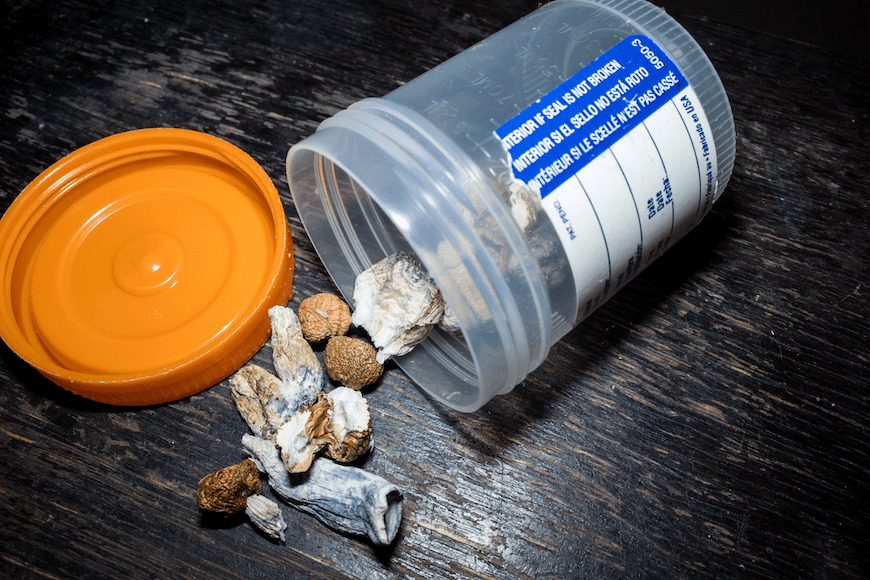Psilocybin use had already started creeping up even before pockets of the country started legalizing the naturally occurring psychedelic back in 2019. A new Rocky Mountain Poison and Drug Safety study, for example, reports that psilocybin use shot up across all age groups. Among younger adults (those between 18 and 29) psilocybin use jumped 44 percent over 2023. Older adults really flocked to it, with usage rates spiking 188 percent.
It’s no wonder. Multiple research efforts over the past few years have shown that the drug could be a potential gold mine for mental health treatment, alleviating symptoms for patients struggling with:
- Eating disorders.
- Major depressive disorder (MDD).
- Post-traumatic stress disorder (PTSD).
- Substance use disorders.
Hope for Mood and Movement Disorders?
Now, new research suggests that psilocybin could offer some symptom relief for Parkinson’s patients.
In what the authors are calling the first empirical trial of its kind, the pilot study reveals that psilocybin safely led to sustained improvements in both non-motor and motor symptoms in study participants living with mild to moderate Parkinson’s disease.
“We are still in very early stages of this work, but this first study went well beyond what we expected,” University of California, San Francisco assistant professor and the paper’s first author, Ellen Bradley, MD, said in a press release. “Many people don’t realize this, but mood symptoms in Parkinson’s are linked to a faster physical decline. And they are actually a stronger predictor of patients’ quality of life with Parkinson’s than their motor symptoms.”
Methodology
The trial, which researchers conducted under close, clinical supervision with carefully monitored doses paired with psychotherapeutic support, involved participants submitting to a pair of treatment sessions.
The research team conducted follow-up assessments for three months after treatment, during which they failed to uncover any acute cardiovascular concerns, cognitive impairments, or emergence of psychosis.
Instead, the study’s authors discovered that common Parksinson’s symptoms – such as anxiety, depression, fatigue, and trouble sleeping, all improved dramatically.
Additionally, participants enjoyed huge, rapid improvements in mood. Some participants even reported relief as soon as a week after their first session. It’s a much quicker response than any traditional antidepressant provides. Even better, the benefits persisted for at least three months. Care partners confirmed these reports.
Risks. And Further Improvements.
All of the participants tolerated the treatment well, regardless of whether they were already taking dopaminergic medication. Even so, the study did carry some risks. Two participants reported tough psychedelic sessions, along with lingering emotional distress. One even shared thoughts about pursuing medically assisted suicide. The authors stressed the importance of acknowledging these risks, even in the most structured clinical settings.
Notably, psilocybin also appeared to produce boosts in motor function. This surprised researchers, who admitted that motor symptoms typically benefit from dopaminergic medications rather than psychiatric therapies. They offered three potential explanations:
- Direct serotonergic modulation of motor circuits.
- Indirect benefits via mood improvement.
- Or a more profound impact on the underlying neurodegeneration of PD itself.
Research has shown that psilocybin can influence serotonin and glutamate systems, crub inflammation, and trigger neuroplasticity. These benefits could be relevant to mood as well as the overall disease progression. While the exact mechanisms remain cloudy, researchers insist that the study results warrant further study into whether psilocybin could alter the trajectory of PD progression.
The trial also highlighted that participants reported increased cognitive flexibility post-treatment—a trait believed to underpin long-term emotional resilience. Though the study did not find a strong statistical correlation between mood and cognition improvements, prior research suggests enhanced cognitive flexibility could be a critical component of psilocybin’s therapeutic effects.
Moving Forward
The study also leaves open questions about the optimal dose and role of psychotherapy in psilocybin treatment. While 25 mg is a standard therapeutic dose, some participants improved on 10 mg. And the necessity of an intense psychedelic experience for therapeutic gain remains uncertain.
“The vast majority of brain diseases still lack interventions that change the course of illness,” said the study’s senior author, Joshua Woolley, MD, PhD, associate professor at UCSF. “We can often treat the symptoms, but we don’t alter the trajectory or prevent decline. Now, that’s beginning to change. These results raise the exciting possibility that psilocybin may help the brain repair itself.”
While these are still early results, the researchers suggest psilocybin therapy could offer a novel and multifaceted approach to treating Parkinson’s disease, especially for patients struggling with mood dysfunction. The potential benefits for motor and cognitive symptoms, though, open new avenues for research. Larger, placebo-controlled trials, the authors contend, should be a priority.
Further Reading
Global Parkinson’s Disease Cases to Surge by 2050



